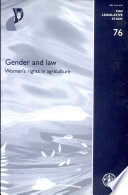
Gender and law : women's rights in agriculture
By - Cotula, Lorenzo.Women constitute a large portion of the economically active population engaged in agriculture. International instruments on human rights, the environment and sustainable development reaffirm the principle of non-discrimination on the basis of sex or gender. Yet women often face gendered obstacles in realizing their rights and feeding their families. This study analyses the gender dimension of agriculture-related legislation in a selection of different countries around the world, examining the legal status of women in three key areas: rights to land and other natural resources; rights of women agricultural workers; and rights concerning women's agricultural self-employment activities, ranging from women's status in rural cooperatives to their access to credit, training and extension services.
ISSN 1014-6679